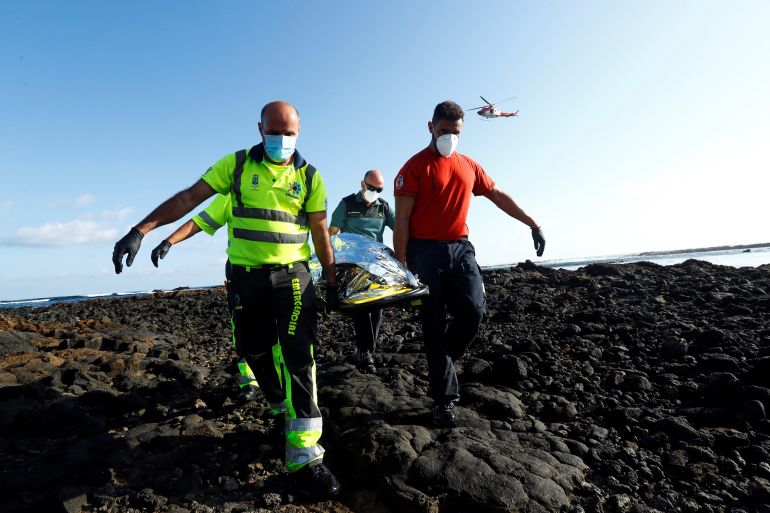Canary Islands: Concerns grow for thousands of child refugees
Children are fleeing Africa alone to make the dangerous journey across the Atlantic, a route in which hundreds have died.

A refugee crisis is brewing in the Canary Islands, where tens of thousands of people fleeing northern and west Africa have arrived in recent months.
More than 8,000 refugees and migrants arrived in the Spanish archipelago – situated off the coast of northwest Africa – in November alone, a record figure.
Keep reading
list of 4 itemsOutrage as French police filmed removing refugees by force
City to city, camp to camp: Afghan refugees struggle to find home
UN: Urgent aid needed for 3 million refugees in northern Syria
A larger number of people are using the Atlantic route, which is considered more dangerous, after several Mediterranean Sea routes were blocked, with more patrols deterring people to attempt crossings.
Canary Island officials have raised the alarm, particularly as more children are making the journey by boat. Since October, more than 2,000 such children have arrived.
Among them was 16-year-old Diawoiye, from Mali, who fled conflict and economic insecurity in his own country before disembarking on the island of Gran Canaria.
He spent six days at sea making the journey.
“In Mali, there’s a war now … my mother and father are over there, and now they are getting old and there’s no money, so I left and came here,” he told Al Jazeera.
More than 500 people have died at sea while following the Atlantic route, with most deaths in October and November, according to the International Organization for Migration (IOM).
Children ‘scarred for life’
The Canary Islands’ regional government has opened 21 emergency centres for unaccompanied children.
It has also repeatedly asked the Spanish government in Madrid, as well as the European Union, for more financial assistance to manage the unfolding situation.
Save the Children’s Catalina Perazzo said more needed to be done to support the refugee children.
“They are in overcrowded conditions after making this life-threatening sea crossing, and they will need psychological support because of what they have seen and gone through,” she told Al Jazeera.
“For example, they have seen people dying on board and being thrown into the sea, they have suffered from a lack of food and some may have experienced violence and, of course, separation from their parents – all these factors can scar the children for life.”
Mame Cheikh Mbaye, of the Federation of African Associations, said many of the children may have had their parents’ backing.
“Each young person is a community project,” he told Al Jazeera. “They [the parents] look for a strategy to make their project successful and they know that the children have more chance to be able to stay in Europe.”
About 20,000 refugees and migrants have reached the Canary Islands so far this year, up from 2,557 in 2019.
Al Jazeera’s Bernard Smith, reporting from Gran Canaria, said: “It’s much harder to cross from Libya and Morocco across the Mediterranean to Europe now, because of increased funding for maritime patrols for the Libyan and Moroccan coastguards – money given by the Europeans.
“So instead people are coming this way because there are less patrols along the west African coast, and so it’s easier for them to make it over.”